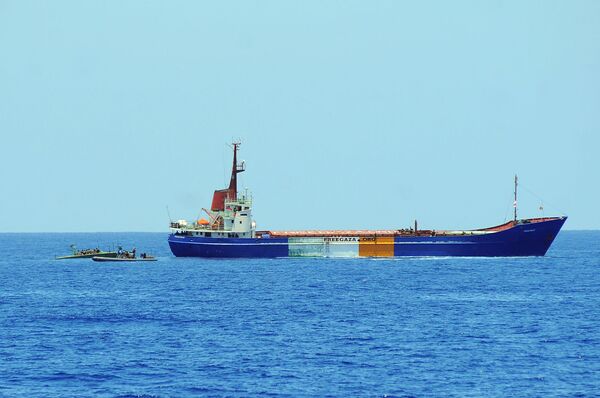On May 31, 2010, Israeli forces boarded six ships carrying humanitarian aid to Gaza. Nine Turkish citizens were killed in the ensuing clashes between Israeli commandos and passengers. Now several more ships carrying humanitarian aid, human rights activists and journalists are expected to run the Gaza blockade this week.
It appears that Israel's use of force has only hardened activists' resolve to reach Gaza. It's unclear how this will end.
Israel's bumbling raid has proved to be a military, media and diplomatic fiasco. The public seems less concerned that the passengers of one ship were not exactly peaceful human rights activists.
Israel does not pay much attention to international criticism. This is not Israel's first international incident, nor is it likely to be the last. The danger for Israel lies in the damage it has done to its already complicated relationship with Turkey. Ankara has already retaliated by freezing cooperation on energy and water supplies. There are also plans to cease military cooperation, not to mention their strategically important security partnership.
But this is not the only danger Israel faces. Meir Dagan, the director of Mossad, Israel's national intelligence agency, recently remarked that Israel is becoming less of an asset and more of a liability for the United States. Washington is currently the only thing standing between Israel and international sanctions, and its financial and military assistance underwrites Israel's security.
However, this incident is still a far cry from a diplomatic disaster. For all its bluster, Turkey has not severed diplomatic ties with Israel, and behind the scenes politicians are trying to identify the sponsors of the Gaza Freedom Flotilla, to determine whether it was financed by terrorist organizations, as some news outlets have reported. European analysts and high-ranking politicians say that Israel is well within its rights to ensure that shipments to Gaza do not contain weapons.
How these shipments are to be made is another issue. Will they be carried by provocative flotillas in the future?
Over 60 years ago, similar actions prompted the UN to pass a resolution establishing two independent Jewish and Arab states in Palestine. At that time, ships carrying Holocaust survivors from war-torn Europe attempted to reach British-controlled Palestine in direct violation of the ban on immigration. British military authorities stopped the ships and returned the refugees to Europe. Despite the efforts of the British, some refugees managed to run the blockade. The ships that failed to reach Palestine succeeded in creating media scandals that garnered publicity for the cause.
One of the most famous incidents involved the SS Exodus, which the British Royal Navy boarded in July 1947. Journalists called the Exodus and its 4,500 Jewish refugees a "floating Auschwitz." Some claim the photos of refugees being forcibly removed from the ship (and later sent to camps for displaced persons in Germany) influenced public opinion around the world, prompting the UN to end British control of Palestine and partition the land.
Israel understands the PR game it has been caught up in. They know how it looks to the world when they stop ships carrying humanitarian aid. But it seems that they see no alternative.
Ships will continue to run the blockade. Sheikh Hassan Nasrallah, the leader of Hezbollah, said late last week that new "freedom flotillas" must depart for Gaza, and that Israel would see the flag of Hezbollah instead of the Turkish flag flying over the ships. While this statement can be interpreted in a variety of ways, it will hardly make Israel more accommodating. Israel will continue to operate under the assumption that every Gaza-bound ship is carrying weapons and militants, regardless of the flag they are sailing under. The flag of Hezbollah would simply make matters worse, like a red flag to a bull.
Wars in the Middle East have broken out over less. And currently, Israel faces provocation after provocation.
To be sure, breaking Israel's blockade on Gaza is a noble cause. But do human rights activists in the European and U.S. political establishments realize that they are gradually becoming the puppets of Hamas and Hezbollah?
Both organizations have been "blacklisted" by the United States and the European Union. While this may not matter to leftist human rights activists in Europe, it should matter a great deal to members of the European Parliament and other officials.
Do those sailing on humanitarian missions to Gaza realize that Israel is less to blame for the blockade than the rift between Fatah and Hamas? Egypt has also imposed a blockade on Gaza. The checkpoint between Gaza and Egypt is only opened periodically. Egypt conspicuously opened it after the May 31 tragedy to blunt possible criticism from other Arab states. But will the checkpoint remain open for long? Although Hamas and Fatah leaders are taking steps toward reconciliation, past attempts have ended in failure. Will the international community's current plans to ease the situation in Gaza be stymied once again by the conflicts among Palestinians?
Israel shares responsibility for the breakdown of the peace process, for Gaza's problems and for the latest tragedy. But the responsibility is not Israel's alone.
The opinions expressed in this article are the author's and do not necessarily represent those of RIA Novosti.
MOSCOW. (Maria Appakova for RIA Novosti)

